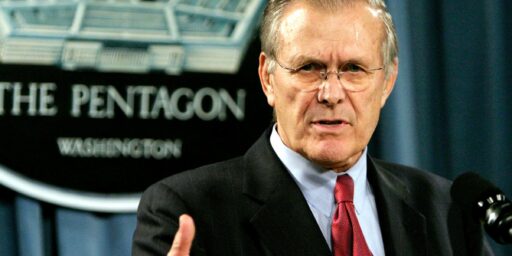RUMMY’S PLAN FOR IRAQ
Don Rumsfeld must be lining himself up for a job as a columnist, as he has another op-ed in today’s WSJ. He draws a very interesting analogy in defending against the criticisms of the postwar reconstruction of Iraq so far:
There are still difficulties in Iraq, to be sure–crime, inflation, gas lines, unemployment. But the fact that such difficulties exist should come as no surprise: No nation that has made the transition from tyranny to a free society has been immune to the difficulties and challenges of taking that path–not even our own.
The years after our war of independence involved a good deal of chaos and confusion. There were uprisings such as Shays’ Rebellion, with mobs attacking courthouses and government buildings. There was rampant inflation caused by the lack of a stable currency and the issue of competing paper monies by the various states. There were regional tensions between mercantile New England and the agrarian south. There was looting and crime and a lack of an organized police force. There were supporters of the former regime whose fate had to be determined. Our first effort at a governing charter–the Articles of Confederation–failed miserably, and it took eight years of contentious debate before we finally adopted our Constitution and inaugurated our first president. And, unlike the people of Iraq, we did not face the added challenge of recovering from the trauma of decades of brutal rule by a dictator like Saddam Hussein.
The point is this: It is now just seven weeks since Iraq’s liberation–and the challenges are there. As Thomas Jefferson put it, “we are not to expect to be translated from despotism to liberty in a featherbed.” It took time and patience, but eventually our Founders got it right–and we hope so will the people of Iraq–over time.
Certainly a point worth remembering. He devotes the rest of the piece to outlining, in some detail, what the plan for Iraq’s rebuilding looks like. In typical Rumsfeldian candor, he says one of the tenets of the plan is “trial and error.” This is a daunting and in many ways unprecedented undertaking; I think it is wise to admit that we’re going to make mistakes along the way and also to be willing to change aspects of the plan that don’t seem to be working.




Don’t forget he’s snubbing any country that wasn’t supportive of the war when it comes to rebuilding contracts. A bit of knife twisting to the French.
—